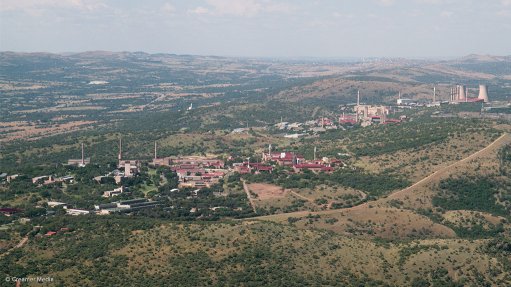
An aerial view of Necsa’s complex at Pelindaba, west of Pretoria
Photo by: Duane Daws/Creamer Media
The South African Nuclear Energy Corporation (Necsa) announced on Tuesday that there had been a “non-risk” incident at its NTP Radioisotopes subsidiary. This incident resulted in the activation of safety protocols, which temporarily halted the production of medical radioisotopes. At no time was there any danger to people, property or the environment, Necsa assured.
The event took place on May 31. It was described as a “minor technical problem” which resulted in the detection of a “slight hydrogen excess” in one of NTP’s production hot cells. Radioisotope production was suspended at once. A hot cell is a shielded radiation containment chamber, with a window, in which nuclear materials are handled, using remotely-operated manipulators (also known as waldoes).
“Safety is Necsa’s highest priority,” affirmed CEO Phumzile Tshelane. “Internal oversight for Quality Control, Quality Assurance and Nuclear safety is monitored and strengthened continually. We observe regular compliance and assurance exercises.” He commended NTP’s staff for their company’s “impressive performance”.
“The Necsa Group operates strictly in accordance with its prescribed governance framework and regulations,” assured board chairperson Dr Kelvin Kemm. “We are in the humanitarian business of saving lives and will resume production of medical isotopes as soon as safety protocols allow. I fully support the CEO’s decision to suspend production temporarily.”
The corporation has given the assurance that it maintains global best practice regarding nuclear safety. It pointed out that the safe management of nuclear technologies and material was of the utmost importance under the terms of its licence. It is required to report all incidents to the National Nuclear Regulator (NNR). This incident was immediately reported to the NNR.
“On 14 May, before a crowd of 1 000 people from 72 countries, Necsa received a prestigious award at the annual AtomExpo [forum] in Sochi, Russia (site of the 2014 Winter Olympics) for the world’s best non-power project,” highlighted Tshelane. “Necsa was described as the world’s best nuclear medicine company. The awards committee praised Necsa’s contribution to world peace in recognition of it maintaining uninterrupted production while its scientists converted the Safari reactor from using bomb grade uranium to civilian grade.”